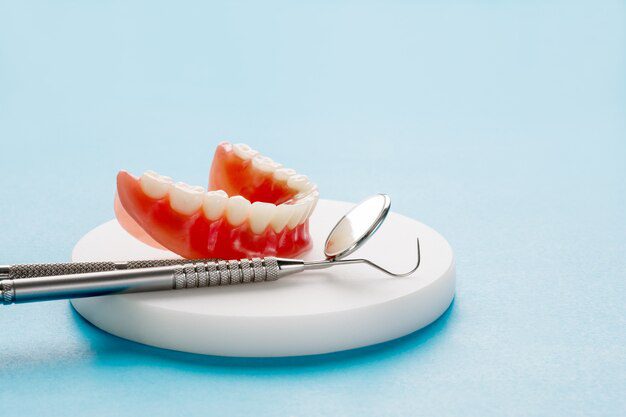Dentures are a popular and effective solution for restoring smiles and oral function for people with missing teeth. However, like any dental appliance, dentures can sometimes come with their share of challenges. If you or a loved one wears dentures, you must know about common denture problems and how to address them. This article will explore some common denture issues and provide practical solutions to overcome them.
Common Denture Problems & Their Solution
1. Denture Discomfort And Irritation
Initially, dentures may cause discomfort or irritation as the mouth adjusts to the new appliance. Sore spots, gum tenderness, or bulkiness can be common issues.
Give your mouth time to adapt to the dentures. Follow your dentist’s instructions for wearing and removing them, gradually increasing wear time. If sore spots persist, consult your dentist for adjustments to ensure a better fit.
2. Difficulty Speaking Clearly
New dentures can impact speech, causing slurred or altered speech patterns, particularly during the first few days of wearing them.
Practice speaking aloud in front of a mirror, reading out loud, or repeating challenging words to improve speech clarity. With time and practice, your tongue and mouth muscles will adapt to the dentures, improving speech.
3. Denture Slippage Or Looseness
Ill-fitting dentures may slip or feel loose, leading to discomfort, difficulties while eating, and a lack of confidence in social situations.
Visit your dentist for denture adjustments or a possible denture reline to improve the fit. Adhesive products can offer temporary relief but should not be a long-term solution if dentures no longer fit properly.
4. Mouth And Gum Soreness
Prolonged wear of dentures can sometimes cause soreness in the mouth and gums.
Practice proper oral hygiene by cleaning your dentures regularly and massaging your gums to stimulate blood flow. If soreness persists, give your gums a break by removing the dentures for a few hours each day. Always consult your dentist if the discomfort continues.
5. Difficulty Eating Certain Foods
Eating with dentures may be challenging, especially with sticky or hard foods.
Start with soft foods and cut them into smaller, manageable pieces. Chew slowly and evenly on both sides of the mouth. As you gain confidence, gradually introduce more challenging foods into your diet.
6. Bad Breath
Dentures can trap food particles and bacteria, leading to bad breath or an unpleasant taste in the mouth.
Clean your dentures thoroughly with a brush, mild soap, or denture cleaner after each meal. Additionally, brush your gums, tongue, and palate with a soft toothbrush to maintain oral hygiene and fresh breath.
7. Denture Stains And Discoloration
Over time, dentures may accumulate stains and discoloration from food, beverages, or smoking.
Regularly clean your dentures using denture cleaning tablets or a mild solution of water and vinegar. Avoid using abrasive cleaners that could damage the denture surface. If stains persist, consult your dentist for professional cleaning or other solutions.
The Bottom Line
While dentures offer an excellent solution for those with missing teeth, it’s crucial to address any denture problems promptly to ensure comfort and proper functionality. Regular dental check-ups are essential to assess the condition of your dentures and make necessary adjustments or replacements. By being proactive and following the provided solutions, you can enjoy the benefits of dentures while minimizing common issues and maintaining good oral health.

